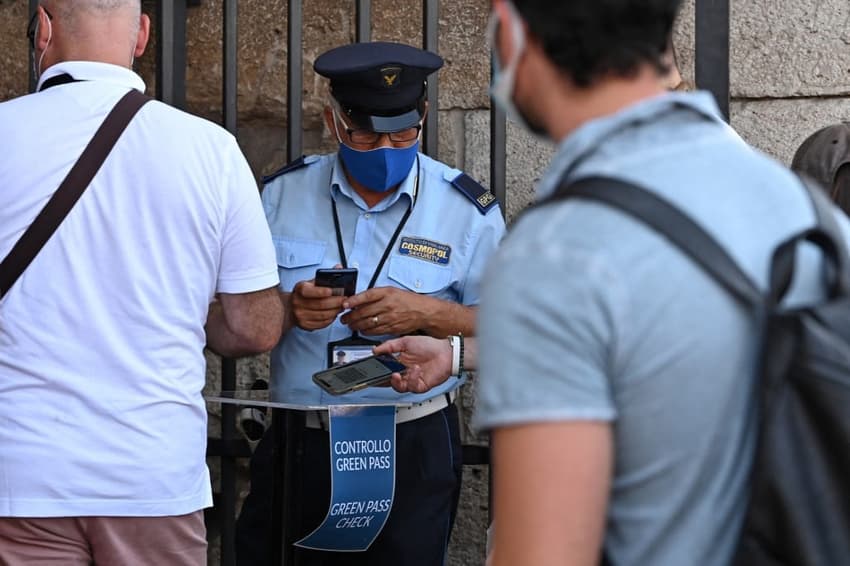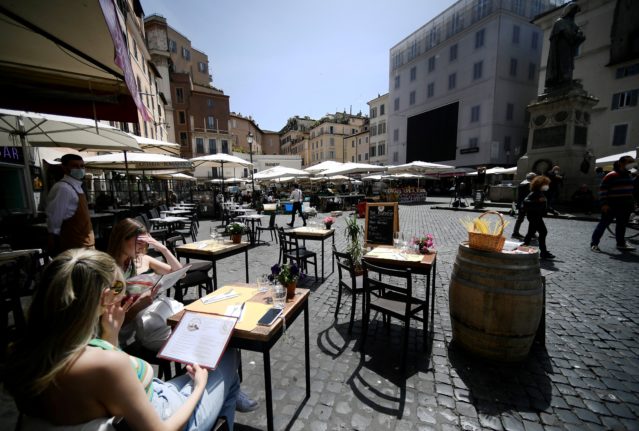Reader question: Do I need a Covid green pass for my trip to Italy?

If you're planning to travel to Italy soon, make sure you know the rules on using Covid-19 health certificates in the country.
Question: 'I'm travelling to Italy in April and I'm fully vaccinated. I've read that I'll need to show an Italian 'green pass' for entry to restaurants and other venues. How do I get one?'
Italy has eased some of its coronavirus containment measures as of April 1st, but its health certificate, known as the 'green pass', is still a requirement at many venues.
As travel restarts this spring, The Local has received dozens of questions like the one above from people planning to visit Italy from abroad, with confusion arising amid a series of rule changes by the Italian government over the past few months.
The good news for visitors is that you probably will not need to obtain an Italian green pass.
If you're vaccinated, Italy recognises proof of vaccination issued anywhere in the world on par with its own 'super' green pass, so the vaccination certificate issued in your home country (such as a US CDC card) should get you into any venue in Italy that is subject to this requirement.
People who were vaccinated in the EU or UK will have received a QR code that can be easily scanned and checked just like an Italian green pass.
READ ALSO: How Italy’s Covid rules change in April
Those with a paper vaccination or recovery certificate without a QR code simply need to show their certificate to the person conducting the checks. You do not need a QR code for your certificate to be recognised.
Make sure however that your vaccination certificate will be seen as valid under Italian rules.
If you have been fully vaccinated and boosted, your proof of vaccination has indefinite validity as a ‘super green pass’ equivalent in Italy. If you haven't had a booster dose but have completed the primary vaccination cycle, your certificate is valid for six months since the last dose.
You can find more detailed information about how the green pass rules work for vaccinated visitors to Italy here.
If you have proof of recovery from Covid-19, you can also use this on the same terms as an Italian 'super' green pass. This must be a recovery certificate issued by a medical authority (evidence of a negative test result, for example, doesn't count) and it will be seen as valid for six months since the date of infection.
If you have neither proof of vaccination nor recovery, you'll need to show proof of a negative test result instead. This is where you would need to get an Italian green pass.
Many venues will now allow you to enter with just proof of a negative test result, known as a 'basic' green pass. This is a QR code issued based on a negative result after being tested at a registered facility, such as a pharmacy or clinic.
READ ALSO: How tourists and visitors can get a coronavirus test in Italy

Visitors enjoy an outdoor lunch in Rome's Campo dei Fiori. Photo by Filippo MONTEFORTE / AFP
The pass will be valid for 48 hours from the time the test was carried out in the case of a rapid test, or 72 hours in the case of a PCR test.
This means that if you're in Italy for a longer visit you will need to be tested repeatedly to retain access to a valid pass.
You can find more details about getting a Covid test as a visitor to Italy here.
Where and when do Italy's green pass rules apply?
For several months now, Italy’s ‘reinforced’ or ‘super’ green pass health certificate or an equivalent, showing that the holder is vaccinated against or recently recovered from Covid, has been required to access most venues and services across the country.
After the most recent rule change on April 1st, these requirements have been loosened.
Hotels and public transport are no longer subject to any green pass requirements. Proof of a negative Covid test result – the basic green pass, therefore – will be enough for entry to indoor bars and restaurants. If you’re sitting outside a bar or restaurant, you’ll no longer need any form of health pass at all.
Some spaces require only the ‘basic green pass’, which can be easily obtained via a negative Covid test result from a pharmacy for those without a vaccination or recovery certificate (see above).
The rules apply to everyone in the country aged over 12.
Italy's green pass rules are expected to be eased further in May, and could be scrapped entirely by mid-June.
See full details of the green pass system and requirements by venue here.
At the border
For entry to Italy, you again do not need a 'green pass' specifically, but must show valid proof of vaccination, recovery OR a recent negative test result under the current travel rules, in place until at least April 30th.
As Italy has outsourced the enforcement of these rules to airlines and other transport operators, this documentation will be required when boarding your flight to Italy.
If you're travelling by road or rail, there may instead be police checks at the border.
For more information:
- What you need to know about travel to Italy this spring
- Where you now need to show a Covid green pass in Italy
- How do Italy’s Covid green pass rules apply to visitors?
See the latest news from The Local about travel to Italy here.
Find more information about Italy’s Covid-19 health restrictions on the Italian health ministry’s website (available in English).
Comments
See Also
Question: 'I'm travelling to Italy in April and I'm fully vaccinated. I've read that I'll need to show an Italian 'green pass' for entry to restaurants and other venues. How do I get one?'
Italy has eased some of its coronavirus containment measures as of April 1st, but its health certificate, known as the 'green pass', is still a requirement at many venues.
As travel restarts this spring, The Local has received dozens of questions like the one above from people planning to visit Italy from abroad, with confusion arising amid a series of rule changes by the Italian government over the past few months.
The good news for visitors is that you probably will not need to obtain an Italian green pass.
If you're vaccinated, Italy recognises proof of vaccination issued anywhere in the world on par with its own 'super' green pass, so the vaccination certificate issued in your home country (such as a US CDC card) should get you into any venue in Italy that is subject to this requirement.
People who were vaccinated in the EU or UK will have received a QR code that can be easily scanned and checked just like an Italian green pass.
READ ALSO: How Italy’s Covid rules change in April
Those with a paper vaccination or recovery certificate without a QR code simply need to show their certificate to the person conducting the checks. You do not need a QR code for your certificate to be recognised.
Make sure however that your vaccination certificate will be seen as valid under Italian rules.
If you have been fully vaccinated and boosted, your proof of vaccination has indefinite validity as a ‘super green pass’ equivalent in Italy. If you haven't had a booster dose but have completed the primary vaccination cycle, your certificate is valid for six months since the last dose.
You can find more detailed information about how the green pass rules work for vaccinated visitors to Italy here.
If you have proof of recovery from Covid-19, you can also use this on the same terms as an Italian 'super' green pass. This must be a recovery certificate issued by a medical authority (evidence of a negative test result, for example, doesn't count) and it will be seen as valid for six months since the date of infection.
If you have neither proof of vaccination nor recovery, you'll need to show proof of a negative test result instead. This is where you would need to get an Italian green pass.
Many venues will now allow you to enter with just proof of a negative test result, known as a 'basic' green pass. This is a QR code issued based on a negative result after being tested at a registered facility, such as a pharmacy or clinic.
READ ALSO: How tourists and visitors can get a coronavirus test in Italy

The pass will be valid for 48 hours from the time the test was carried out in the case of a rapid test, or 72 hours in the case of a PCR test.
This means that if you're in Italy for a longer visit you will need to be tested repeatedly to retain access to a valid pass.
You can find more details about getting a Covid test as a visitor to Italy here.
Where and when do Italy's green pass rules apply?
For several months now, Italy’s ‘reinforced’ or ‘super’ green pass health certificate or an equivalent, showing that the holder is vaccinated against or recently recovered from Covid, has been required to access most venues and services across the country.
After the most recent rule change on April 1st, these requirements have been loosened.
Hotels and public transport are no longer subject to any green pass requirements. Proof of a negative Covid test result – the basic green pass, therefore – will be enough for entry to indoor bars and restaurants. If you’re sitting outside a bar or restaurant, you’ll no longer need any form of health pass at all.
Some spaces require only the ‘basic green pass’, which can be easily obtained via a negative Covid test result from a pharmacy for those without a vaccination or recovery certificate (see above).
The rules apply to everyone in the country aged over 12.
Italy's green pass rules are expected to be eased further in May, and could be scrapped entirely by mid-June.
See full details of the green pass system and requirements by venue here.
At the border
For entry to Italy, you again do not need a 'green pass' specifically, but must show valid proof of vaccination, recovery OR a recent negative test result under the current travel rules, in place until at least April 30th.
As Italy has outsourced the enforcement of these rules to airlines and other transport operators, this documentation will be required when boarding your flight to Italy.
If you're travelling by road or rail, there may instead be police checks at the border.
For more information:
- What you need to know about travel to Italy this spring
- Where you now need to show a Covid green pass in Italy
- How do Italy’s Covid green pass rules apply to visitors?
See the latest news from The Local about travel to Italy here.
Find more information about Italy’s Covid-19 health restrictions on the Italian health ministry’s website (available in English).
Join the conversation in our comments section below. Share your own views and experience and if you have a question or suggestion for our journalists then email us at [email protected].
Please keep comments civil, constructive and on topic – and make sure to read our terms of use before getting involved.
Please log in here to leave a comment.